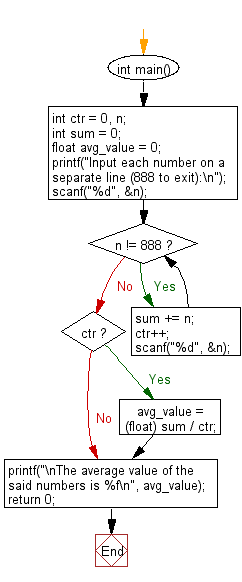C Exercises: Calculate and print the average of some integers
C Basic Declarations and Expressions: Exercise-84 with Solution
Write a C program to calculate and print the average of some integers. Accept all the values preceding 888.
Sample Input: 12
15
24
888
Sample Solution:
C Code:
#include<stdio.h>
int main()
{
int ctr = 0, n;
int sum = 0;
float avg_value = 0;
printf("Input each number on a separate line (888 to exit):\n");
scanf("%d", &n);
while(n != 888) {
sum += n;
ctr++;
scanf("%d", &n);
}
if(ctr)
avg_value = (float) sum / ctr;
printf("\nThe average value of the said numbers is %f\n", avg_value);
return 0;
}
Sample Output:
Input each number on a separate line (888 to exit): The average value of the said numbers is 17.000000
Flowchart:

C programming Code Editor:
Contribute your code and comments through Disqus.
Previous:Write a C program which reads an integer (7 digits or fewer) and count number of 3s in the given number.
Next: Write a C program to print a table of all the Roman numeral equivalents of the decimal numbers in the range 1 to 50.
What is the difficulty level of this exercise?
Test your Programming skills with w3resource's quiz.
C Programming: Tips of the Day
Static variable inside of a function in C
The scope of variable is where the variable name can be seen. Here, x is visible only inside function foo().
The lifetime of a variable is the period over which it exists. If x were defined without the keyword static, the lifetime would be from the entry into foo() to the return from foo(); so it would be re-initialized to 5 on every call.
The keyword static acts to extend the lifetime of a variable to the lifetime of the programme; e.g. initialization occurs once and once only and then the variable retains its value - whatever it has come to be - over all future calls to foo().
Ref : https://bit.ly/3fOq7XP
- New Content published on w3resource:
- HTML-CSS Practical: Exercises, Practice, Solution
- Java Regular Expression: Exercises, Practice, Solution
- Scala Programming Exercises, Practice, Solution
- Python Itertools exercises
- Python Numpy exercises
- Python GeoPy Package exercises
- Python Pandas exercises
- Python nltk exercises
- Python BeautifulSoup exercises
- Form Template
- Composer - PHP Package Manager
- PHPUnit - PHP Testing
- Laravel - PHP Framework
- Angular - JavaScript Framework
- Vue - JavaScript Framework
- Jest - JavaScript Testing Framework
